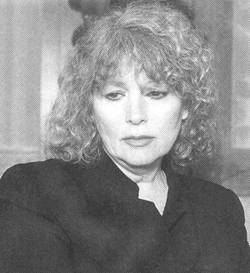
A column of Dr. Dineen
in

Peggy Claude-Pierre:
Angel for anorexics or misguided amateur?
 Controversy's
rising again over Victoria's Montreux Counselling Clinic. Next Monday,
Richard Stanwick, the Capital Region's Health Officer, will seek a court
injunction to stop it's Director, Peggy Claude-Pierre, from providing
residential treatment for eating disorders.
Controversy's
rising again over Victoria's Montreux Counselling Clinic. Next Monday,
Richard Stanwick, the Capital Region's Health Officer, will seek a court
injunction to stop it's Director, Peggy Claude-Pierre, from providing
residential treatment for eating disorders.
The issue is strongly polarised. On the one side are Claude-Pierre's
fans. They include supporters from across Canada and around the world
who've heard about her work as well as many former clients who idolize
her, calling her their saviour, an angel and "the most maternal
person" they've ever met.
To these people, she's a sincere, dedicated woman who is offering the
last hope to desperate anorexics whom the medical community has failed.
But to her critics, most of them professionals with M.D.'s, she's a
misguided amateur. They scoff at her claims of almost 100-per-cent success
and point out that her alleged revolutionary approach contains nothing
they haven't known about for years.
Pointing to claims of a disgruntled former client, reports of too much
touching between staff and clients, possible force-feeding, and the
lack of the psychiatric assessment and medical supervision they deem
necessary for patient care, they're raising concerns that her method
of treatment puts patients at serious risk.
Some go so far as to call her clinic "cult-like" and to imply
that she's a charlatan taking advantage of the vulnerable.
While the immediate dispute before the B.C. Supreme Court centres around
the technicality that she doesn't have a license to provide the residential
care she's been offering, the real controversy in the court of public
opinion centres on: Who knows the real Claude-Pierre?
Quite possibly, both sides do; I think it's a mistake to take sides
with either her friends or her foes.
Self-destructive eating habits can be traced as far back as Medieval
times, when they held religious significance as "miracle fasters"
who stopped eating claimed divine inspiration.
Such behaviours came to be considered a curious disorder peculiar to
young women and by the late 1800's they began to be given the misnomer
of a disease. In 1980, anorexia was officially adopted into psychiatry's
bible, the Diagnostic and Statistical Manual, as a bona fide psychiatric
disorder.
So, what was once considered an inexplicable human issue is now in the
domain of medicine even though there's no clear agreement about what
it is or how to treat it.
It seems that Claude-Pierre could still be doing her counselling if
she had restricted her work to "outpatients." Apparently even
Stanwick, whom some accuse of being "out to get her," would
still accept this arrangement but compromise seems unlikely.
As Claude-Pierre tells her story, she got into this work somewhat by
accident. In their teens, her two daughters successively became anorexic
and she stopped working as a waitress to focus on helping first one,
then the other and their friends with eating problems.
Other parents heard of her success and wanted her to help their daughters
too. From all accounts it seems that Claude-Pierre did a good job of
persuading these young women to eat.
But, as she explains, the number quickly grew to 300, and she converted
a Victorian house into a residence for her clients, somehow assuming
that the provincial government would pay the bills.
That never happened and, out of necessity, she began charging the sort
of fees which her critics suggest are exorbitant although they are in
line with similar clinics in the U.S.
Busy, overextended, distracted by the attention of media icons like
Ophra Winfrey and basking in international popularity, it would seem
that she did what countless others heralded as "healers" have
done. She created a new persona, one of an "innovative therapist"
who has found "the cure," written a bestseller The Secret
Language of Eating Disorders about it, packaged the method, and now
teaches it in workshops and training seminars.
This "angel" had become a psychological entrepreneur.
Whatever it was that made her successful, I'm pretty sure it wasn't
this psychologized formula. I suspect that Peggy just had the "knack"
- some personal quality that made her good at her work, something that
put her in the same category as my favourite aunt who could bake the
best apple pies I've ever tasted or the man who has a way with fixing
old cars or the woman down the street whose roses grow better than mine
A knack according Webster's Dictionary is "a special ready capacity
that is hard to analyze or teach." It's not something you can bottle
into a theory or a skill you can teach to others. When you try, it loses
its power, dissolving into that mixture of sugar and water that's called
Snake Oil.
For all her possible errors in judgment, the one that might ultimately
bring her down isn't what the court decides about the fate of the Montreaux
Clinic, but rather Claude-Pierre's own belief that what she was doing
could be distilled into theory and sold as a method. Sadly, by turning
it into just another therapy, Claude-Pierre may have lost the knack.
tanadineen.com
@ Dr.Tana
Dineen
1998-2007
by Dr. Tana Dineen, special columnist, The Vancouver Sun